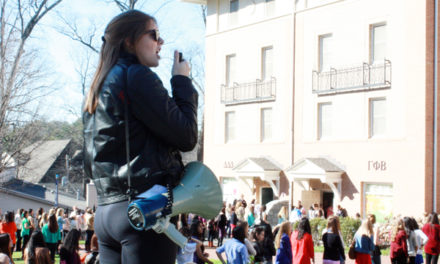David Levinson (’09C) has not seen or talked to his father in six years.
A history major and a member of the Phi Beta Kappa honor society, Levinson is like any other high-achieving alumnus of Emory.
Except that his father is being held hostage off the coast of Iran.
Robert Levinson, now the second longest held hostage in United States history, was a private detective and retired FBI official investigating cigarette smuggling on the Iranian Kish Island.
When David and his mother, Christine, didn’t hear from him in March 2007, that’s when the family went on high alert.
For the next nine months, the family was in contact with U.S. and Iranian government officials. Christine wrote a letter to Iran’s foreign minister asking permission to visit the country, according to a 2007 CNN article.
The family was granted permission in September and visited three months later. According to David, the Iranian government was accommodating and helped them retrace his father’s steps in Iran. However, the trip yielded no results.
Two years went by with no word on David’s father’s whereabouts. Then, in November 2010, the family received a hostage video sent to them anonymously. The video depicted a fatigued Robert saying said he was being held by a “group,” according to the Associated Press. The anonymous group sent the family five photos in April 2011 with Robert clad in an orange jumpsuit and sporting unkempt hair. In each photo, Robert holds a sign bearing a different message. In one photo, the sign reads, “This is the result of 30 years serving for USA.” Another sign reads, “I am here in Guantanamo. Do you know where it is?”
David said his family has met with the State Department and President Obama.
Secretary of State Hillary Clinton has even asked the Iranian government to return Robert, but Iran has denied involvement in the hostage situation, according to a 2011 BBC article.
Now in an effort to revitalize the campaign to bring Robert home, on Jan. 8 of this year the family has released photos it anonymously received two years ago. David said the family hopes to redirect attention to the situation.
“We feel we need to regain momentum in the case and bring the case back to the forefront of Americans’ minds and the governments’ minds,” David said. “My dad’s still out there. He’s still alive. He’s still waiting.”
Although Levinson’s case has been covered by many major media organizations, including the Washington Post, BBC News and CNN, David doesn’t believe enough people know about his father.
David said that he could not explain why the issue has not gained widespread attention in the media.
“We need to make it so that people feel pressured to bring him home,” David said.
David’s family now publicly believes that the Iranian government is behind the captivity.
“I think it generally has to do with the poor relationship between the U.S. and Iran,” David said. “There’s mounting tension on both sides. My father could have been in the wrong place at the wrong time.”
Sandra Mackey, an Atlanta-based writer on Middle Eastern culture and politics, suggested that a multitude of factors are at play in this situation.
“I can certainly understand the family wanting to decide that the Iranian government is responsible,” Mackey said. “And they certainly could be, but it’s a lot more complicated than that.”
Mackey compared Levinson’s case to the Iran Hostage Crisis of 1979, in which Iranian students seized the American embassy in protest as a part of the Iranian Revolution and detained more than 50 Americans as hostages. Mackey said, however, that Levinson’s case is markedly unique from other hostage situations.
“I think it’s significant that [the Iranian government] allowed the family to come over and nothing was turned up,” Mackey said. “In other situations in which hostages were released, the same thing happened, and it produced the people that were being held. That gives a clue that this [the Levinson case] falls in a different category.”
Mackey cited the “fragmented” nature of the Iranian government as a testament to the complexity of the issue. Iran’s political system combines democratic elements with a theocracy, resulting in a complex division of power and control. For this reason, Mackey noted that an important point to consider in this case is who exactly in the Iranian government could be responsible for the holding of Robert.
“Who in the power structure is responsible for holding this man?” Mackey asked. “Is it elements of the revolutionary guard, or is it perhaps a religious leader who has an ideological grudge against the US? That’s very hard to find out.”
Since Robert was investigating illegal activity on Kish, Mackey suggested that his captivity could potentially be related to criminal elements that are not connected to the government.
According to Mackey, Robert Levinson’s status as a former FBI official, as well as worsening relations between the United States and Iran over the years, is important to the case.
“I think this FBI connection, although it had been severed, is putting another spin on the situation,” Mackey said. “The Iranian regime is particularly paranoid because the U.S. has talked about the idea of regime change over the years. They really feel that the U.S. is out to get them.”
David believes that the Iranian government has been pushed to its limits and now it’s up to the U.S. to bring his dad back home.
“All the pressure that can be applied on Iran has been done and that’s why we’ve released documents and videos to create more pressure on everyone who could be involved so people work even more urgently to bring him home,” David says.
Mackey, however, expressed discourage at the mysterious nature of the case and the lack of results.
“I don’t doubt that the U.S. has put pressure on, but [the question is] what pressure they can apply,” Mackey said. “It’s a very challenging situation for both our government and certainly a difficult situation for the family.”
David said no story about his father’s captivity was published at Emory during his time here as a student. Since only few details were known at that time, he said he did not publicize the situation.
“As many Emory students know, going through college without your closest advocate and role model is tough and trying,” David said. “I didn’t know how to deal with it at the time, and I only told close friends and a few professors that I confided in.”
Now that the issue has gotten attention from mainstream media, David said that the Emory community has been sympathetic.
A former alumnus took to the Emory Alumni Association Facebook page to spread the word about a petition in support of making Robert’s case a national priority.
“We’ve received outpouring support from Emory alumni and students, and it has been very heartwarming and compelling,” David said. “It’s a great example of solidarity for the Emory community.”
– Contact Harmeet Kaur at hbhagra@emory.edu
The Emory Wheel was founded in 1919 and is currently the only independent, student-run newspaper of Emory University. The Wheel publishes weekly on Wednesdays during the academic year, except during University holidays and scheduled publication intermissions.
The Wheel is financially and editorially independent from the University. All of its content is generated by the Wheel’s more than 100 student staff members and contributing writers, and its printing costs are covered by profits from self-generated advertising sales.




